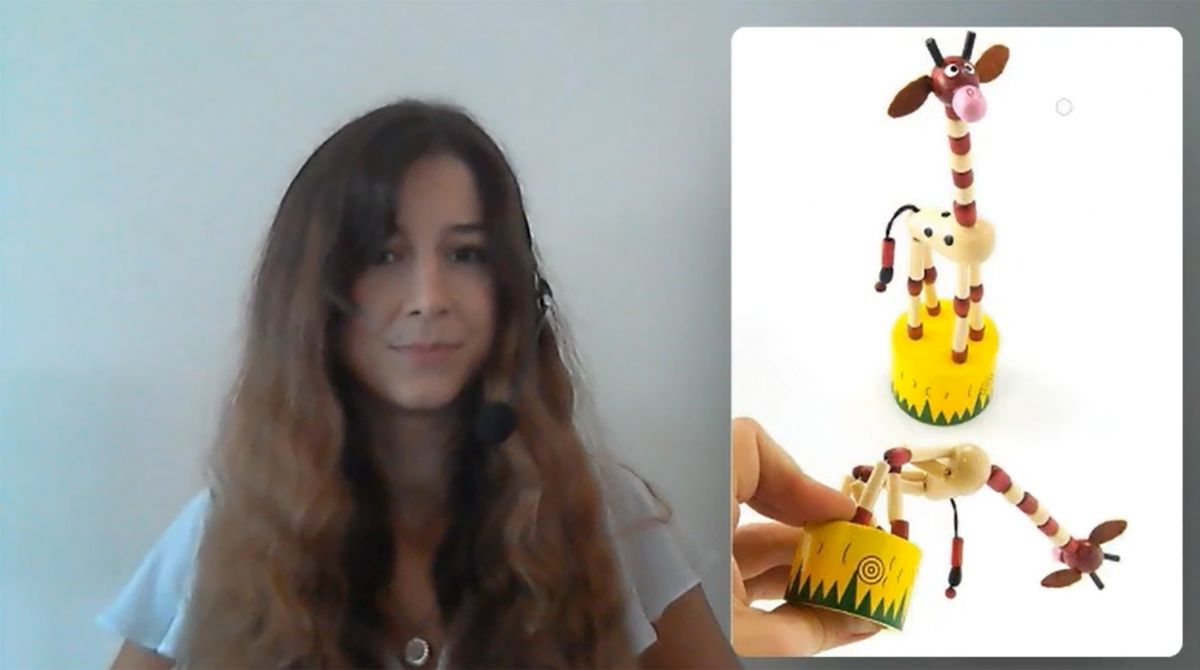Kingston University PhD student wins Vitae Three Minute Thesis national final with presentation about research into sustainable future for concrete
Posted Friday 10 September 2021

A Kingston University postgraduate engineering student has carried off the top prize at this year's Vitae Three Minute Thesis national competition – impressing judges with a presentation that demonstrated her passion for concrete and featured the clever use of a giraffe toy from her childhood. Ana Pavlovic was Kingston University's representative in the annual academic competition, which saw research students from 61 institutions submit spoken presentations on their research topic and its significance in just 180 seconds, alongside an image of their choice.
Ana, from Belgrade in Serbia, has been exploring the use of a common volcanic rock, basalt, as an emerging alternative material to steel for reinforcing concrete structures as part of her PhD, having already completed a Masters degree at Kingston University and a second Masters at the University of Belgrade.
Concrete is the world's most widely used building material, but when reinforced with steel it is susceptible to corrosion – which can be problematic in certain environments. Basalt composite, by comparison, is stronger and lighter than steel and doesn't rust. Ana's research has focused on better understanding how concrete reinforced with basalt FRP might perform over a building's entire lifespan, collecting data using sensors to develop mathematical models to predict its long-term behaviour.
After coming through a quarter and semi final stage, she was one of six finalists who presented to a virtual panel of judges, before being named the judge's choice winner – with a prize of £3,000 in UKRI grant funding for public engagement activities, and an engraved trophy.
"The quality of the other presentations was amazing so it was a big surprise to be named the winner – I'm still trying to process it," she said. "I entered the competition to learn more about explaining my work in a way that conveys its impact in an accessible way and it's been such a great experience. My family and friends back in Serbia were all watching and cheering me on and it meant a lot to be able to share this moment with them."
Ana won plaudits from the judges for making her research accessible and interesting through the use of a collapsible wooden giraffe toy to help explain the principle of prestressing concrete.
One of the judges, PGR environment development manager at the University of Bristol Dr Paul Spencer, 3MT judge, said: "Ana was talking about something that was really quite complicated and potentially quite dry as a topic, so as well as conveying genuine enthusiasm for it, the use of the giraffe toy analogy was absolutely genius for me - devilishly simple but really effective. What I also liked about Ana's presentation was how she clearly articulated the point of her research, which was to test out the robustness of this new material over time which potentially has huge implications for the construction industry."
Ana, who previously won second prize for oral presentation in last year's Institution of Structural Engineers young researchers conference, is now preparing to move into a new role within industry as a senior engineer for decarbonisation, with a view to becoming a chartered engineer.
"Sustainable construction is something I'm passionate about and led me to focus on researching the potential applications for non-corrosive materials as an alternative to steel," she said. "Going forward, working in research and development on sustainable technologies is something I'm really looking forward to being part of," she said.
Ana's PhD supervisor, Associate Professor in structural engineering Dr Ted Donchev, said the research student's success was down to her hard work, talent and organisation. "Ana is an amazing student and there is a high level of interest in her research in this field," he said. "She has a very bright future ahead and I believe her work will lead to wider opportunities for the use of these alternative materials for reinforcing concrete."
Kingston University has been involved in Three Minute Thesis for several years, with students working with academic lead Professor Andrea Petroczi alongside former broadcast journalist and communications consultant Etienne Duval to help them develop key communication skills.
Ana's success – the first time a Kingston University student has won the national final – was just reward for the work she had put into her presentation and demonstrated the value of taking part in the annual competition, Professor Petroczi said.
"We're delighted for Ana, she delivered a fantastic presentation that really showcased the impact of her work as well as her talent, love of concrete and passion for sustainable construction. Each year we work with our students to strike that balance between being interesting and engaging while still having substance and it's fantastic to see Ana go all the way in the final and take home the judges' choice award."
- Find out more about this year's Three Minute Thesis competition.
 Ana Pavlovic with the other five finalists during the Three Minute Thesis national final.
Ana Pavlovic with the other five finalists during the Three Minute Thesis national final. Contact us
General enquiries:
Journalists only:
- Communications team
Tel: +44 (0)20 8417 3034
Email us



